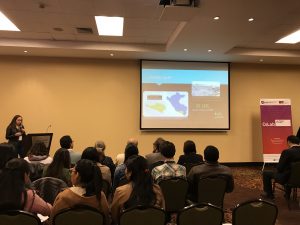Beedie partnership in Peru promotes community engagement for social change and globally responsible leadership
Jan 09, 2018

Students participate in the new Co-Laboratorio AQP program run by Beedie in partnership with Universidad Catolica San Pablo in Arequipa Peru
Beedie faculty June Francis and Kristina Henriksson have launched the new Co-Laboratorio AQP program in partnership with Universidad Catolica San Pablo in Arequipa Peru (UCSP), sharing Beedie’s philosophy of experiential learning and promoting socially responsible business on a global platform.
The first class of 36 students, drawn from across UCSP, recently completed the 20-week, innovative design “lab course” embedded in UCSP’s undergraduate curriculum. Through the program, students worked closely with community stakeholders to develop sustainable solutions to some of the complex socio-economic challenges facing the local region.
“We are helping our partner UCSP to implement a systems-centered design approach in the CoLab AQP course,” says Henriksson.
“This is based on the belief that any problem, even the most difficult ones – such as poverty, gender equality, or clean water for all – can only be solved by paying close attention to the systemic underlying causes”
One team of students tackled the issue of pollution and contamination in the agricultural land around Arequipa, caused by the false belief among farmers that burning organic waste after harvesting would benefit future crops. The team aims to create a social venture to buy organic waste from farmers, from which they will produce organic fertilizer, which can later be sold.
The team consulted with farmers to gain a greater understanding of their situation and how they could be incentivized to change their practices.
“One of my greatest lessons from CoLab was understanding the perspective of the farmers,” says team leader Marinés Mattos.
“I think that young people and everyone in general can make a change, even if it is very small, and we can all collaborate to make a better world.”
Another team targeted the lack of earthquake preparedness in the region, which is at a high risk of seismic activity. The team proposes working with local emergency services and private donors to train residents in preventative measures in case of earthquakes, so consequences could be reduced.
“There are many problems we face as a society, in this city,” says team member Diego Loayza.
“I think the CoLab is a good opportunity to grapple with these problems with stakeholders, bringing our different perspectives and working together.”
CoLab AQP forms part of the larger Co-Laboratorio Peru project at SFU, led by Francis and Henriksson and funded by Global Affairs Canada (through CIRDI). CoLab Peru conducts applied research on inclusive sustainable development from natural resources through advancing cross-sector collaborative learning, planning, governance and practices—for more resilient solutions.
For more information on Co-Laboratorio Peru, visit http://cirdi.ca/project/co-laboratorio-peru/
